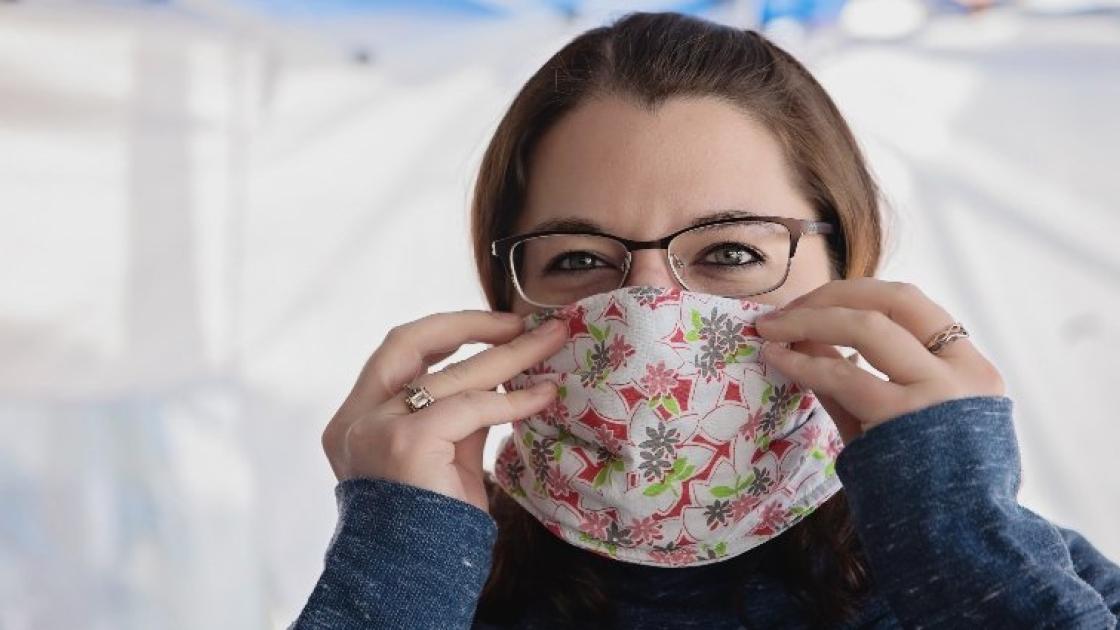
Is your mask irritating your skin? Avoiding “maskne”
Because of COVID-19, people are using face masks more than ever. The intention is good—to prevent people from unknowingly passing the virus to others and to prevent people from getting sick.
But there’s one unexpected consequence of the face mask trend: skin irritation, rashes and breakouts. The problem's become so common it already has its own nickname, “maskne.”
If you are frustrated by “maskne” or other skin problems caused by a surgical mask, N95 respirator or homemade face covering, you do have options. Our dermatology team at SIU Medicine explains why “maskne” happens and what you can do about it.
Why am I breaking out so much?
Face masks are designed to sit snugly against your face and cover your nose and mouth. While this helps prevent germs from spreading, it can also promote the accumulation of oil, sweat and dirt on the skin. This can easily lead to clogged pores, acne and rashes.
Some folks are also breaking out or developing a rash due to an allergy to the mask material itself.
Tips to prevent and heal “maskne”
Before putting on your mask
- Always perform proper hand hygiene with an alcohol-based hand sanitizer or soap and water before touching your face and donning your mask.
- Avoid wearing cosmetics. This should help prevent your pores from clogging.
- Try putting paper tape on the areas of your face that come in direct contact with the mask, or in areas with greater friction. This can prevent allergic reactions and protect your skin without compromising the mask's effectiveness.
After taking off your mask
- It’s so important that it bears repeating: Always perform proper hand hygiene before and after removing your mask.
- Wash your face as soon as you can, using a gentle cleanser. You can even use facial wipes formulated with acne-fighting ingredients that will also remove dirt, oil and makeup.
- If reusing your mask, store it properly with the outside of the mask facing down on a clean surface (such as a paper towel or in a clean plastic food container). Don't put it in a purse or pocket, and avoid touching the inside surface with your hands, since this can introduce more germs and dirt onto the mask. Also, be sure to clean it according to CDC guidelines or as instructed by your facility.
Other things you can do
- Be sure to wash your face regularly, ideally twice per day. This will help eliminate dirt and oils that can build up under the mask and clog your pores. Look for a gentle product that is designed to fit your skin type (e.g., normal, dry, oily or combination).
- If acne already exists, a good face wash with salicylic acid or benzoyl peroxide is helpful for clearing up your breakouts. Prescription Clindamycin lotion or gel is also a great treatment option.
- Keep other items clean, too. Be sure to regularly disinfect your phone and eyeglasses, and change or cleanse your pillow cases, razors, cosmetic brushes and other supplies that can lead to acne if not routinely cleaned.
- Stay hydrated. Research tells us that having dry skin can worsen acne since it may trigger excessive oil production. You can fight dryness and improve your skin’s overall health by drinking plenty of water. While there’s no magic amount of water you should consume, the National Academies of Sciences, Engineering and Medicine suggests that adult men and women should aim for 3.7 liters and 2.7 liters of water per day, respectively. According to Mayo Clinic, about 20 percent of this figure accounts for water found in food, like fruits and vegetables (which also happen to be great for skin health). Just remember that you may need more or less depending on things like your age, activity level and overall health.
Lastly, if your skin is really struggling, consult with a dermatologist who can provide you with more individualized care and guidance.
Breaking Out Because of Your Face Mask?
You don’t have to settle for hiding your irritated skin behind your mask. Contact SIU Medicine at 217-545-8000 to schedule a consultation with a dermatologist or learn more about our comprehensive range of wellness services. We’ve got you “covered” with our evidence-based care backed by peer-reviewed research and experience. Call today.




